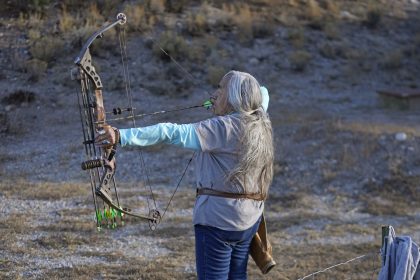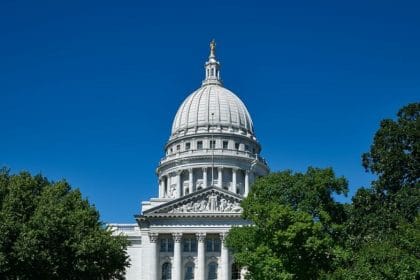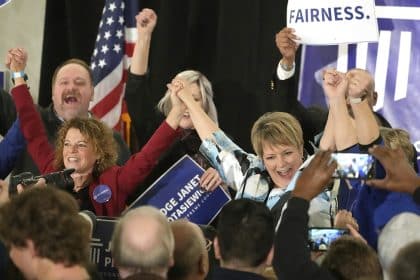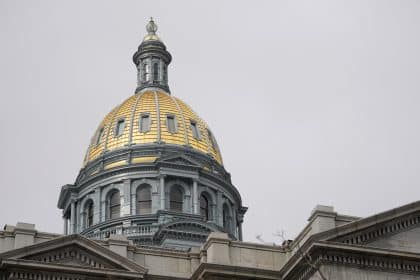Ohio Primary Date Change Inspires Multiple Lawsuits

COLUMBUS, Ohio — State government leaders were preparing for a legal battle and they got it over the last-minute decision late Monday to postpone Ohio’s primary election over concerns about the spread of COVID-19.
The Ohio Democratic Party and Kiara Sanders, a Reynoldsburg woman, filed suit against Secretary of State Frank LaRose in the Ohio Supreme Court late Tuesday afternoon, arguing only lawmakers — not LaRose — could set an election date.
The litigation contends there should not be another primary election day, just an extension of absentee balloting until late April.
LaRose had no authority to send a directive to county boards of elections moving Tuesday’s scuttled election to June 2 and that directive should be rescinded, the filing says.
His “reliance upon factual findings and declarations of the Ohio governor and the director of the Ohio Department of Health to assert jurisdiction to move the date of Ohio’s 2020 presidential primary election … was a quasijudicial act unauthorized by law,” the suit says.
The action asks the high court to order “adequate” opportunities for Ohioans to vote via absentee ballot by April 28.
“The main intent is to allow the primary to continue and preserve it,” said Ohio Democratic Chairman David Pepper. “There are folks out there saying no more votes should be counted after today’s non-primary and that would be a complete injustice.”
Many members of the General Assembly have raised the same question about LaRose’s authority. Members plan to reconvene next week to officially set a new election date.
State Rep. Jason Stephens, R-Kitts Hill, sought Tuesday to intervene in the now-appealed lawsuit filed Monday evening to halt the Tuesday election, arguing only the legislature — not LaRose — can set an election date.
“My client would say the General Assembly is ready and willing to fix the problem they didn’t create,” said Don Brey, a veteran Columbus elections lawyer. “You can’t have executive offices changing the law willy-nilly or finding a judge who will do it on the fly.”
In a joint statement Tuesday night, Ohio Gov. Mike DeWine and LaRose did not challenge the proposal for an absentee ballot-only primary but defended the decision to call off the primary.
“The actions taken by Ohio Department of Health Director Dr. Amy Acton saved Ohio lives. By preventing Ohioans from going to polling locations, we averted a situation which would have gone against the most recent scientific evidence available and could have dangerously advanced the spread of coronavirus across Ohio,” DeWine and LaRose said.
“It is abundantly clear that it would have been impossible to carry out a fair, accessible, and safe election (Tuesday). As we move forward, it is vitally important that Ohioans have a significant period of time to cast mail-in absentee ballots and an opportunity to vote in-person, as was provided in the directive issued (Monday) night by the secretary of state.”
Separately, Lt. Gov. Jon Husted, who served eight years as secretary of state, defended LaRose’s authority to set a June 2 election date.
“As it stands now, Secretary LaRose’s order is the law of the land” unless the General Assembly sets another date for the delayed primary, Husted said
But House Speaker Larry Householder said in a memo Tuesday, “The date of Ohio’s primary election is set by state law and, as the secretary of state has acknowledged, the legal authority to change the date rests with the Ohio General Assembly — not the courts and not via executive fiat. So too does the process and manner in which the election is conducted.”
House Minority Leader Emilia Sykes, D-Akron, wrote in a statement that LaRose was spreading inaccurate information about the election date being moved before the legislature or courts had a chance to act. Rep. Nino Vitale, R-Urbana, made the same allegation.
“We have to be very careful about declaring a crisis, then allowing one un-elected person, who has no recourse to the voters, or anyone else in Ohio, to determine what our freedoms may or may not be. This is tyranny by crisis. Those who trade liberty for safety end up with neither,” Vitale.
“I am ready to do my job,” Rep. John Cross, R-Kenton, said. “Someone else should not be doing my job.”
Cross, who called DeWine’s decision an overreach by the executive branch, floated the idea of extending absentee voting for 30 days rather than setting a new, in-person Election Day. He told The Dispatch his concern was that the COVID 19 outbreak might still be in full swing come June. President Donald Trump suggested Monday that governments could be taking steps to prevent transmission of the virus through August
Meanwhile, the three states that did hold primaries Tuesday were experiencing low turnout and possible lawsuits because their elections were not canceled.
“We felt this could be a real, real disaster,” DeWine explained during his daily media briefing Tuesday.
After initially saying that elections didn’t need to be delayed, Trump said on Tuesday that he “could understand” DeWine closing the polls.
LaRose said he expected lawsuits after he and DeWine moved to close the polls and postpone the election even though a judge had ruled against doing so.
After a day of chaos and confusion on whether Ohio would hold its primary as scheduled, Acton issued an order late Monday night to close the polls. Then LaRose quickly sent a directive to county boards of elections to comply with the order while preparing for a June 2 in-person election.
Hours earlier, a Franklin County Common Pleas Court judge denied a request to close the polls filed by two elderly plaintiffs who said they didn’t want to choose between their health and their right to vote.
An appeal was filed late Monday with the 10th District Court of Appeals, could be dismissed as moot. The Supreme Court denied a separate legal challenge to the primary delay in a vote by justices shortly before 4 a.m. Tuesday.
DeWine said he is open to ideas about rescheduling the election but that he would push for a “significant period of time” for voters to cast ballots, particularly as more of them become ill after contracting coronavirus.
“We are entering a more difficult time. We are going to have more and more of our citizens who become ill,” DeWine said. “We need to allow those citizens who become ill to be able to have the opportunity to vote. The longer we can spread that time out, the better that is.”
DeWine said “we considered just about everything,” including working with legislative leaders to call in the General Assembly and appealing the decision in court Monday night, “but we felt we had to tell people by 10 p.m. We also felt we had a public health emergency, a public health crisis.”
The move to postpone the election was a sudden shift for state leaders. LaRose’s office had maintained throughout the weekend that the election would not be moved.
LaRose said his daily updates from the Ohio Department of Health and the federal Centers for Disease Control and Prevention “radically” changed Monday morning.
First, he received a call from Husted, and shortly afterward a call from DeWine and Acton to tell him it was unsafe to conduct an election. Guidance was shifting, from a ban on gatherings of 100 or more people to 50 or more. In addition, DeWine was prepared to tell Ohioans age 65 or older to self quarantine.
“All throughout this process, from the time the governor declared an emergency, I was asking CDC and Ohio Department of Health on a daily basis ‘Will it be safe for voters and poll workers to come to the polls on March 17 in Ohio.’ Unequivocally, their advice had been ‘Yes, it will be.’ They didn’t hesitate on that,” LaRose said.
As late as Sunday night, LaRose said he was told it would be safe to conduct the election.
“Because I don’t have an MD after my name … I was taking my advice from the public health professionals.”
DeWine press secretary Dan Tierney said the CDC’s recommendation Sunday that gatherings be restricted to fewer than 50 people was a “game-changer.”
Discussions on postponing the primary accelerated into Monday morning and involved DeWine, Acton, Husted and LaRose, Tierney said.
DeWine feared leaving the polls open while cautioning older Ohioans to remain isolated would send an unintended message that it constituted “voter suppression.” That “mixed message” contributed to the decision to close the polls, the governor said.
“Should have been made earlier,” DeWine said of the decision. “We can all look back and say I wish I had done that, I wish I had made it earlier. But that’s when we made that decision, and that’s where we are today.”
Despite the advice regarding those 65 or older, the 73-year-old DeWine is working long hours with groups of people while holding his daily news conferences, although he was isolated Tuesday from reporters, who asked questions via video from two other rooms.
Asked why DeWine is disregarding the advice to older Ohioans, Tierney replied, “The goal with all these recommendations and advisories is to eliminate nonessential interactions. It is obvious the governor leading the state of Ohio is an essential function of state government.”
LaRose said Tuesday that state leaders first left the decision in the hands of a judge, rather than shutting down the election through the health director, because they believed a judge could both close the polls and set a new election date.
“When the court did not want to exercise its authority, the governor felt strongly that we needed to protect the health and safety of Ohioans,” Tierney said of why Acton’s order was imposed,
Without a court order to delay the election, LaRose said he, DeWine, Husted and Attorney General Dave Yost moved to “plan B,” which included Acton’s order and his directive.
“Given the circumstances and unusual circumstances last night, I thought it was best given the authorities that I had to direct the boards to follow the health directive and begin the process of conducting an election for June 2,” LaRose said Tuesday.
“We can squabble about the process. We can debate about should this have been done, should this filing have been made before that filing. Really, that’s not the most productive conversation. Happy to engage in it as a learning lesson for the future. But that’s not what I’m focused on right now.”
———
Columbus Dispatch reporter Anna Staver contributed to this report.
———
© 2020The Columbus Dispatch (Columbus, Ohio)
Distributed by Tribune Content Agency, LLC
























